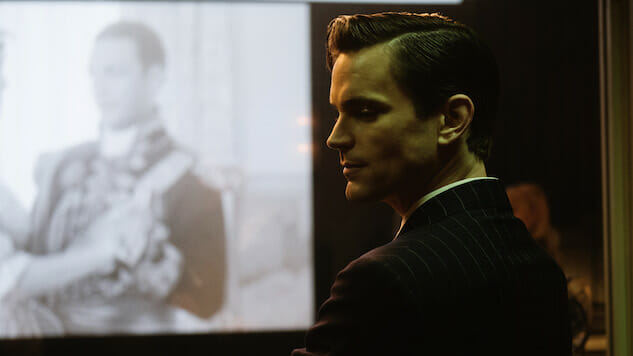Is a Truly Masterful Adaptation of Fitzgerald Possible? Amazon’s The Last Tycoon Comes Damn Close
Photo: Aaron Epstein/Amazon Prime Video
F. Scott Fitzgerald had a lot of troubled relationships: with alcohol, with his unstable wife, with his own creativity, and definitely with Hollywood. All of those themes come up in his unfinished final novel The Last Tycoon, which was made into a movie by Elia Kazan, with a screenplay by Harold Pinter and a superstar cast led by Robert De Niro. With that kind of pedigree, it beggars belief that you could end up with a total turkey, but they definitely pulled it off, managing to make even Jeanne Moreau and Tony Curtis annoying. That film gets one thing very right, though. Its ending is as ambiguous and abrupt as the novel itself, honoring the posthumous and incomplete source text with dexterity and integrity. But like just about everything Fitzgerald wrote for Hollywood—and like just about every Fitzgerald novel Hollywood has tried to take on—there’s generally something hollow and disappointing when the two come together.
Has Amazon Studios’ new series The Last Tycoon managed to get at the heart of Fitzgerald’s fictional magic?
Oh, probably not, but it certainly puts together a tense, stylish, meticulously detailed and plot-dense spin on the book Fitzgerald didn’t live to finish. People will compare it to Mad Men in terms of its worshipful faithfulness to period detail, and I won’t argue with them (in fact, the crew includes a huge clutch of former Mad Men stylists and designers). It has color and panache and mostly good pacing and it’s got a bright kind of relevance—and perhaps this is a success in adapting a novelist who was metaphor-driven—reflecting a strikingly contemporary set of pressures and tangles and social issues (race, class, immigration, religious intolerance, economic instability, displacement and homelessness, and civil rights are all bubbling cauldrons in late-thirties Hollywood). I’ll say this: Fitzgerald scholars will probably quibble with it and plenty of people will find plenty to sigh at, but it isn’t boring or soulless. At all.
Monroe Stahr (Matt Bomer) is a wunderkind movie producer. While his mentor, Pat Brady (Kelsey Grammer), is the name on the shingle, everyone knows who really runs things at Brady-American. Monroe’s meticulous, controlling, incredibly driven, and haunted by the untimely death of his wife, movie star Minna Davis. Brady’s daughter, Celia (Lily Collins), is in love with him, and Celia’s mother, Rose (Rosemarie DeWitt), has a slightly off-the-grid relationship with him as well. He’s dying to make Brady a real force to be reckoned with, a true competitor to the likes of MGM and Warner—and when I say “dying to,” it’s more than a figure of speech, since everyone knows he has a heart condition that could kill him at any moment. The machinations of the studio are grueling but thrilling and he’s a masterful producer (maybe a projection of the productive and successful man Fitz wanted, but usually didn’t manage, to be). Then he meets Kathleen Moore (Dominique McElligott), a young Irish waitress with a bizarre resemblance to his late wife and an even more bizarre disinterest in “being in the pictures.” And then—say it with me—hijinks ensue.
The pilot takes a few minutes to find its footing: I found myself very lost in the opening, and not in a “wow, this so perfectly evokes the chaotic multivalent world of a studio lot” way. Just a “what the hell’s going on?” way. However, once it gets going, it’s really a lot of fun, evocative of the zeitgeist of prewar Hollywood. (There’s a running subplot involving a German government official who represents Hitler and threatens to shut the studio down at the faintest hint of anti-Nazi content, for instance.) It’s lavish and glamorous and busy. The relationships among the characters are complicated, mercurial or mysterious. Everyone becomes unwittingly entangled with people who are not who they seem to be; everyone is in over his or her head. At any given time it’s impossible to tell who’s for real and who’s… putting on an act, playing a role, setting up a MacGuffin or dazzling someone else with special effects in order to obscure their true designs. Everyone has a hidden side. Everyone has some form of false front, like a two-dimensional façade in an exterior shot on the lot. Beneath the sleek, glamorous surfaces of the studio sets and the characters’ lives there’s a hell of a lot of seething, dirty, nasty business going on. It’s ruthless and beautiful, full of twists.
This show also toys with the source material, making fictional characters interact with historical ones and pitting Fitzgerald’s fictional Brady-American Pictures against the actual large studios of the day (MGM, Columbia, Warner, Universal). Louis B. Mayer, Fritz Lang, Marlene Dietrich, and producer Irving Thalberg (Fitzgerald’s real-life model for Monroe) all appear as characters in the narrative alongside a stable of fictional actors, directors, producers and writers. The admixture gives the series dimension and also, it’s fun. The actors are great. (I love DeWitt’s turn as Brady’s frustrated wife; Chloe Guidry gets props for a thoroughly child-abuse-inspiring performance as a hideous Shirley Temple-oid Spoiled Little Shit; and Iddo Goldberg is a hilariously nasty Fritz Lang). Bomer’s Monroe Stahr actually has charisma and chemistry and intensity, and Grammer and McElligott and Collins are all wonderful foils. This series has many strengths.